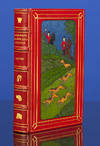
De ecclesiae autorita/tate (sic!) & de veterum scriptis libellus
by Melanchthon, Philip (1497-1560)
- Used
- Fine
- Hardcover
- first
- Condition
- Fine
- Seller
-
Chevy Chase, Maryland, United States
Payment Methods Accepted
About This Item
Wittenberg: Josef Klug, 1539. FIRST EDITION, VARIANT, with a correction for a passage on leaf G5v printed above the colophon. Hardcover. Fine. Bound in modern boards, overlaid with a printed leaf. A very good copy with deckled edges in gatherings A, B, and E. Elaborate woodcut initials, attractive architectural title page border, early minor annotations, very light occ. browning to edges, D3 with a clean tear, minor damp to margins of final 2 gatherings. "Philip Melanchthon's 'On the Authority of the Church and the Writings of the Ancient Fathers' (hereafter 'De ecclesiae autoritate') occupies a prominent place in the canon of his theological writings. Few texts of the Reformation period state so clearly the principles according to which the Fathers and the councils of the church may be considered authentic sources for Christian doctrine. However, to set the work within the canon of Melanchthon's theological work is not necessarily to say that other genres are not present in it...
"In addition to being a response to reform-Catholicism, 'De ecclesiae autoritate' addressed changing relationships among Protestants, in particular between princes and theologians. In both contexts the treatise is a sharpened statement of the principles of evangelical doctrine and church life.
"As the title indicates, the central theme of the work is the authority of the church, a topic of utmost importance in the discussions of the late 1530s. Melanchthon's discussion demonstrates that the church itself must be defined as clearly as the principles that determine its authenticity. Melanchthon defines the church as a visible community, and not the 'Platonic republic' that Roman Catholic polemicists had accused the Reformers' 'communio sanctorum' (community of saints) of being. As a visible community the church is a mixed congregation of pious and impious alike, a macrocosm of the individual believer as 'simul iustus et peccator.' In emphasizing this aspect of Lutheran ecclesiology, 'De ecclesiae autoritate' complements the Augsburg Confession and Apology: the Confession had identified the gospel as one of the marks of the church, and 'De ecclesiae autoritate' states that the gospel is articulated in the articles of faith, which the church teaches and learns.
"The church is the body that adheres to and sustains the articles: understanding the church this way marks a new development in Melanchthon's thought and reworks the dialectic of divine and human in the life of the Christian community. By grounding the church in the articles of faith, Melanchthon denies the church a role in formulating doctrine...
"Among the Catholic theologians it was understood that the church as an arbiter of doctrine not only could resolve points of dispute but, further, could formulate doctrines without biblical grounds. For Melanchthon, on the other hand, the articles of faith are biblical, fixed, and absolute. The church retains them, and preserving them is the mark of the church -a position diametrically opposed to the Romanist view that doctrine is valid when and because the church has explicitly formulated it. In this treatise Melanchthon restricts the definition of the Word of God to the biblical Word, thereby limiting the role of councils and theologians in formulating doctrine...
"[Yet] 'De ecclesiae autoritate' is clearly about the authority of the ecclesial community and not simply about authorities for doctrine. The Word of God remains the final authority in all matters affecting the church, but the Word is not the sole authority being discussed in Melanchthon's treatise. For just as the church is the visible body of the faithful, so too the authorities are the clerical and magisterial agents entrusted with the visible church and the faith of her members. 'De ecclesiae autoritate' charges those agents with that stewardship, yet gives them no independent authority."(Keen, Political Authority and Ecclesiology in Melanchthon's "De Ecclesiae Autoritate", in Church History , Mar., 1996, Vol. 65, No. 1 (Mar., 1996), pp. 1-14).
"In addition to being a response to reform-Catholicism, 'De ecclesiae autoritate' addressed changing relationships among Protestants, in particular between princes and theologians. In both contexts the treatise is a sharpened statement of the principles of evangelical doctrine and church life.
"As the title indicates, the central theme of the work is the authority of the church, a topic of utmost importance in the discussions of the late 1530s. Melanchthon's discussion demonstrates that the church itself must be defined as clearly as the principles that determine its authenticity. Melanchthon defines the church as a visible community, and not the 'Platonic republic' that Roman Catholic polemicists had accused the Reformers' 'communio sanctorum' (community of saints) of being. As a visible community the church is a mixed congregation of pious and impious alike, a macrocosm of the individual believer as 'simul iustus et peccator.' In emphasizing this aspect of Lutheran ecclesiology, 'De ecclesiae autoritate' complements the Augsburg Confession and Apology: the Confession had identified the gospel as one of the marks of the church, and 'De ecclesiae autoritate' states that the gospel is articulated in the articles of faith, which the church teaches and learns.
"The church is the body that adheres to and sustains the articles: understanding the church this way marks a new development in Melanchthon's thought and reworks the dialectic of divine and human in the life of the Christian community. By grounding the church in the articles of faith, Melanchthon denies the church a role in formulating doctrine...
"Among the Catholic theologians it was understood that the church as an arbiter of doctrine not only could resolve points of dispute but, further, could formulate doctrines without biblical grounds. For Melanchthon, on the other hand, the articles of faith are biblical, fixed, and absolute. The church retains them, and preserving them is the mark of the church -a position diametrically opposed to the Romanist view that doctrine is valid when and because the church has explicitly formulated it. In this treatise Melanchthon restricts the definition of the Word of God to the biblical Word, thereby limiting the role of councils and theologians in formulating doctrine...
"[Yet] 'De ecclesiae autoritate' is clearly about the authority of the ecclesial community and not simply about authorities for doctrine. The Word of God remains the final authority in all matters affecting the church, but the Word is not the sole authority being discussed in Melanchthon's treatise. For just as the church is the visible body of the faithful, so too the authorities are the clerical and magisterial agents entrusted with the visible church and the faith of her members. 'De ecclesiae autoritate' charges those agents with that stewardship, yet gives them no independent authority."(Keen, Political Authority and Ecclesiology in Melanchthon's "De Ecclesiae Autoritate", in Church History , Mar., 1996, Vol. 65, No. 1 (Mar., 1996), pp. 1-14).
Reviews
(Log in or Create an Account first!)
Details
- Bookseller
- Liber Antiquus
(US)
- Bookseller's Inventory #
- 4416
- Title
- De ecclesiae autorita/tate (sic!) & de veterum scriptis libellus
- Author
- Melanchthon, Philip (1497-1560)
- Format/Binding
- Hardcover
- Book Condition
- Used - Fine
- Quantity Available
- 1
- Edition
- FIRST EDITION, VARIANT, with a correction for a passage on leaf
- Publisher
- Josef Klug
- Place of Publication
- Wittenberg
- Date Published
- 1539
- Weight
- 0.00 lbs
Terms of Sale
Liber Antiquus
Returns accepted within 7 days of receipt. All returns must be packed, insured, and shipped as they were sent. All returns must arrive safely and in the condition in which they were sent before a refund will be issued.
About the Seller
Liber Antiquus
Biblio member since 2020
Chevy Chase, Maryland
About Liber Antiquus
Liber Antiquus sells early printed books (15th to 18th century) and early manuscripts in a number of fields. We have been in business for 22 years and are a member of ABAA and ILAB.
Glossary
Some terminology that may be used in this description includes:
- Fine
- A book in fine condition exhibits no flaws. A fine condition book closely approaches As New condition, but may lack the...
- Colophon
- The colophon contains information about a book's publisher, the typesetting, printer, and possibly even includes a printer's...
- Title Page
- A page at the front of a book which may contain the title of the book, any subtitles, the authors, contributors, editors, the...
- New
- A new book is a book previously not circulated to a buyer. Although a new book is typically free of any faults or defects, "new"...
- Edges
- The collective of the top, fore and bottom edges of the text block of the book, being that part of the edges of the pages of a...
- Gatherings
- A term used in bookbinding, where a gathering of sheets is folded at the middle, then bound into the binding together. The...
- First Edition
- In book collecting, the first edition is the earliest published form of a book. A book may have more than one first edition in...







